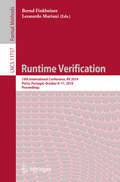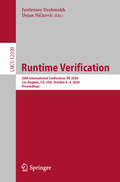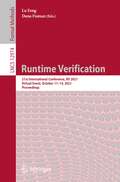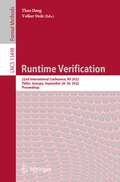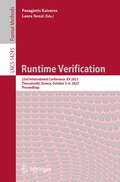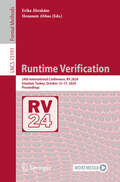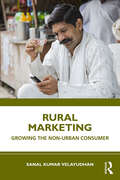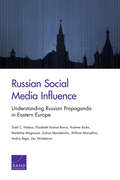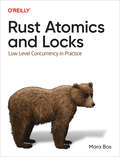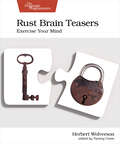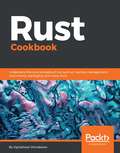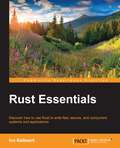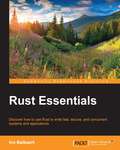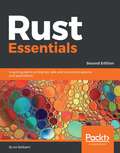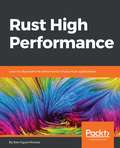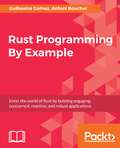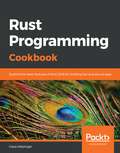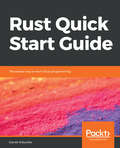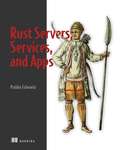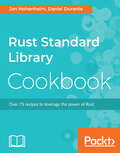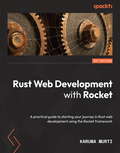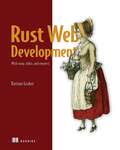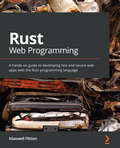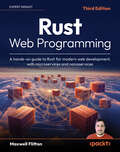- Table View
- List View
Runtime Verification: 19th International Conference, RV 2019, Porto, Portugal, October 8–11, 2019, Proceedings (Lecture Notes in Computer Science #11757)
by Leonardo Mariani Bernd FinkbeinerThis book constitutes the refereed proceedings of the 19th International Conference on Runtime Verification, RV 2019, held in Porto, Portugal, in October 2019.The 25 regular papers presented in this book were carefully reviewed and selected from 38 submissions.The RV conference is concerned with all aspects of monitoring and analysis of hardware, software and more general system executions. Runtime verification techniques are lightweight techniques to assess system correctness, reliability, and robustness; these techniques are significantly more powerful and versatile than conventional testing, and more practical than exhaustive formal verification.Chapter “Assumption-Based Runtime Verification with Partial Observability and Resets” and chapter “NuRV: a nuXmv Extension for Runtime Verification“ are available open access under a Creative Commons Attribution 4.0 International License via link.springer.com.
Runtime Verification: 20th International Conference, RV 2020, Los Angeles, CA, USA, October 6–9, 2020, Proceedings (Lecture Notes in Computer Science #12399)
by Dejan Ničković Jyotirmoy DeshmukhThis book constitutes the refereed proceedings of the 20th International Conference on Runtime Verification, RV 2020, held in Los Angeles, CA, USA, in October 2020. The conference was held virtually due to the COVID-19 pandemic. The 14 regular papers and 2 short papers presented in this book were carefully reviewed and selected from 43 submissions. Also included are an invited paper, 5 tutorial papers, 6 tool papers, and a benchmark paper. The RV conference is concerned with all aspects of monitoring and analysis of hardware, software and more general system executions. The papers are organized in the following topical sections: runtime verification for autonomy; runtime verification for software; runtime verification with temporal logic specifications; stream-based monitoring; and runtime verification for cyber-physical systems.
Runtime Verification: 21st International Conference, RV 2021, Virtual Event, October 11–14, 2021, Proceedings (Lecture Notes in Computer Science #12974)
by Dana Fisman Lu FengThis book constitutes the refereed proceedings of the 21st International Conference on Runtime Verification, RV 2021, held virtually during October 11-14, 2021.The 11 regular papers and 7 short/tool/benchmark papers presented in this book were carefully reviewed and selected from 40 submissions. Also included is one tutorial paper. The RV conference is concerned with all aspects of monitoring and analysis of hardware, software and more general system executions.
Runtime Verification: 22nd International Conference, RV 2022, Tbilisi, Georgia, September 28–30, 2022, Proceedings (Lecture Notes in Computer Science #13498)
by Thao Dang Volker StolzThis book constitutes the refereed proceedings of the 22nd International Conference on Runtime Verification, RV 2022, held in Tbilisi, Georgia, during September 28-30, 2022. The 12 regular papers and 10 short papers presented in this book were carefully reviewed and selected from 40 submissions. The RV conference is concerned with all aspects of monitoring and analysis of hardware, software and more general system executions. Runtime verification techniques are crucial for system correctness, reliability, and robustness; they provide an additional level of rigor and effectiveness compared to conventional testing, and are generally more practical than exhaustive formal verification.
Runtime Verification: 23rd International Conference, RV 2023, Thessaloniki, Greece, October 3–6, 2023, Proceedings (Lecture Notes in Computer Science #14245)
by Panagiotis Katsaros Laura NenziThis book constitutes the refereed proceedings of the 23rd International Conference on Runtime Verification, RV 2023, held in Thessaloniki, Greece, during October 3–6, 2023. The 13 full papers and 7 short papers presented in this book together with 4 tutorial papers and 2 invited papers were carefully reviewed and selected from 39 submissions. The RV conference is concerned with all aspects of novel lightweight formal methods to monitor, analyze, and guide the runtime behavior of software and hardware systems. Runtime verification techniques are crucial for system correctness, reliability, and robustness; they provide an additional level of rigor and effectiveness compared to conventional testing and are generally more practical than exhaustive formal verification.
Runtime Verification: 24th International Conference, RV 2024, Istanbul, Turkey, October 15–17, 2024, Proceedings (Lecture Notes in Computer Science #15191)
by Erika Ábrahám Houssam AbbasThis book constitutes the refereed proceedings of the 24th International Conference on Runtime Verification, RV 2024, held in Istanbul, Turkey, during October 15-17, 2024. The 11 full papers, 5 short papers and 2 tool papers included in this book were carefully reviewed and selected from 31 submissions. They were organized in topical sections as follows: Invited Paper; Cyber-physical Systems; Temporal Logics; Speci cation and Visualization; Deep Neural Networks; and Distributed Systems.
Rural Marketing: Growing the Non-urban Consumer
by Sanal Kumar VelayudhanRural markets offer a sizable and resilient pool of consumers to organizations and marketers. This book offers a comprehensive understanding of the fundamentals of rural marketing that influence consumer behaviour within the framework of a rapidly changing economy. The book: - includes in-depth discussions on critical issues in rural markets as well as case-studies that examine their socio-cultural nuances, peculiarities, and their economic and technological environments; - looks at concepts that are unique to rural markets from the perspective of the buyer and the marketer and analyses buying behaviour and its influences as well as the pricing, value, and positioning of products by brands; - analyses emerging trends and the future of these markets and the introduction of digitization and ecommerce in rural areas; - offers marketing tools and a detailed understanding of rural markets for professionals working in small or low-income markets. The cutting-edge learning tools presented in this book will make it of interest to professionals, students, and researchers working in rural marketing and management, business and economics, management studies, business planning, and marketing.
Russell Simmons: From the Streets to the Music Business (Extraordinary Success with a High School)
by Shaina C. IndovinoIn the last few decades, more and more people are going to college to further their education. It's hard to become a scientist, a professor, or a businessperson without getting some sort of college degree--but college isn't always necessary to achieve success. Some people are ready to enter the workforce right after high school. Russell Simmons was one of those people. The music mogul began his career promoting parties and concerts for rappers and DJs few people outside of New York City had ever heard of. Today, he's helped to spread hip-hop music and culture around the globe. Few people have changed music and business as much as Russell Simmons. And what's most amazing about his story is that the music business mogul has done it all without a college degree!
Russian Social Media Influence: Understanding Russian Propaganda in Eastern Europe
by Todd C. Helmus Andrew Radin Zev Winkelman William Marcellino Andriy Bega Elizabeth Bodine-Baron Madeline Magnuson Joshua MendelsohnRussia employs a sophisticated social media campaign against former Soviet states that includes news tweets, nonattributed comments on web pages, troll and bot social media accounts, and fake hashtag and Twitter campaigns. Nowhere is this threat more tangible than in Ukraine. Researchers analyzed social media data and conducted interviews with regional and security experts to understand the critical ingredients to countering this campaign.
Rust Atomics and Locks: Low-Level Concurrency in Practice
by Mara BosThe Rust programming language is extremely well suited for concurrency, and its ecosystem has many libraries that include lots of concurrent data structures, locks, and more. But implementing those structures correctly can be very difficult. Even in the most well-used libraries, memory ordering bugs are not uncommon.In this practical book, Mara Bos, leader of the Rust library team, helps Rust programmers of all levels gain a clear understanding of low-level concurrency. You'll learn everything about atomics and memory ordering and how they're combined with basic operating system APIs to build common primitives like mutexes and condition variables. Once you're done, you'll have a firm grasp of how Rust's memory model, the processor, and the role of the operating system all fit together.With this guide, you'll learn:How Rust's type system works exceptionally well for programming concurrency correctlyAll about mutexes, condition variables, atomics, and memory orderingWhat happens in practice with atomic operations on Intel and ARM processorsHow locks are implemented with support from the operating systemHow to write correct code that includes concurrency, atomics, and locksHow to build your own locking and synchronization primitives correctly
Rust Brain Teasers: Exercise Your Mind
by Herbert WolversonThe Rust programming language is consistent and does its best to avoid surprising the programmer. Like all languages, though, Rust still has its quirks. But these quirks present a teaching opportunity. In this book, you'll work through a series of brain teasers that will challenge your understanding of Rust. By understanding the gaps in your knowledge, you can become better at what you do and avoid mistakes. Many of the teasers in this book come from the author's own experience creating software. Others derive from commonly asked questions in the Rust community. Regardless of their origin, these brain teasers are fun, and let's face it: who doesn't love a good puzzle, right? What better way to exercise your brain and increase your Rust programming knowledge than with a collection of dynamic brain teasers? As you read through each of these puzzles and try to work out the answers, you'll not only learn about Rust's unique quirks and peculiarities, you'll also have loads of fun along the way. Dive right in and get started with example code and sample problems that cover numbers and text, shadowing and memory, and everything in between. Try to figure out why a particular program won't compile, why it produces unexpected output, or why it panics and terminates with an error message. Once you've run the code and read the answer, it's time to get to the heart of the matter with a detailed explanation. Learn why a program produced the result it did, and discover how similar issues might affect the code you write in your own programs, even in production. Sourced from engaging discussions within the Rust community, real-world problems, and even reader feedback, these challenges will certainly surprise, enlighten, and entertain you. Are you ready to experience Rust like never before? Then sharpen your brain and get ready for a challenge! What You Need: This book assumes you have some knowledge of the Rust programming language. To work through the brain teasers in this book, you'll need a working Rust environment on any platform. You can install Rust by visiting https://rustup.rs/. You'll also need a text editor or Rust-friendly IDE.
Rust Cookbook
by Vigneshwer Dhinakaran75-80 recipes for learning Rust programming About This Book • Learn to build high-performance Rust units and integrate them into your existing application • Work through recipes on performance, robustness, security, memory management, and scalability • Work through recipes to build foreign function interface with C, JS, and Python Who This Book Is For If you want to write Rust programs, then this book is for you. This book is for those who have a basic knowledge of Rust or any programming language. If you are a C/C developer who is migrating to Rust for various reasons, this book is ideal for you. What You Will Learn • Understand system programming language problems and see how Rust provides unique solutions • Get to know the core concepts of Rust to develop fast and safe applications • Explore the possibility of integrating Rust units into existing applications to make them more efficient • Achieve better parallelism, security, and performance • Explore ways to package your Rust application and ship it for deployment in a production environment • Discover how to build web applications and services using Rust to provide high-performance to the end user In Detail If you are building concurrent applications, server-side programs, or high-performance applications, you will benefit from this language. This book comes with a lot of application-specific recipes to kick-start your development of real-world high-performance applications with the Rust programming language and integrating Rust units into your existing applications. In this book, you will find some 80 practical recipes written in Rust that will allow you to use the code samples right away in your existing applications. These recipes have been tested with stable rust compiler versions of 1.14.0 and above. This book will help you understand the core concepts of the Rust language, enabling you to develop efficient and high-performance applications by incorporating features such as zero cost abstraction and better memory management. We'll delve into advanced-level concepts such as error handling, macros, crates, and parallelism in Rust. Toward the end of the book, you will learn how to create HTTP servers and web services, building a strong foundational knowledge in server-side programming and enabling you to deliver solutions to build high-performance and safer production-level web applications and services using Rust. Style and approach This book helps you learn the core concepts of Rust faster by taking a recipe-based approach, where you can try out different code snippets to understand a concept.
Rust Essentials
by Ivo BalbaertThis book is intended for software developers interested in systems level and application programming, and are looking for a quick entry into using Rust and understanding the core features of the framework. It is assumed that you have a basic understanding of Java, C#, Ruby, Python or JavaScript.
Rust Essentials
by Ivo BalbaertThis book is intended for software developers interested in systems level and application programming, and are looking for a quick entry into using Rust and understanding the core features of the framework. It is assumed that you have a basic understanding of Java, C#, Ruby, Python or JavaScript.
Rust Essentials - Second Edition: A quick guide to writing fast, safe, and concurrent systems and applications
by Ivo BalbaertLeverage the functional programming and concurrency features of Rust and speed up your application development About This Book • Get started with Rust to build scalable and high performance applications • Enhance your application development skills using the power of Rust • Discover the power of Rust when developing concurrent applications for large and scalable software Who This Book Is For The book is for developers looking for a quick entry into using Rust and understanding the core features of the language. Basic programming knowledge is assumed. What You Will Learn • Set up your Rust environment to achieve the highest productivity • Bridge the performance gap between safe and unsafe languages • Use pattern matching to create flexible code • Apply generics and traits to develop widely applicable code • Organize your code in modules and crates • Build macros to extend Rust's capabilities and reach • Apply tasks to tackle problems concurrently in a distributed environment In Detail Rust is the new, open source, fast, and safe systems programming language for the 21st century, developed at Mozilla Research, and with a steadily growing community. It was created to solve the dilemma between high-level, slow code with minimal control over the system, and low-level, fast code with maximum system control. It is no longer necessary to learn C/C++ to develop resource intensive and low-level systems applications. This book will give you a head start to solve systems programming and application tasks with Rust. We start off with an argumentation of Rust's unique place in today's landscape of programming languages. You'll install Rust and learn how to work with its package manager Cargo. The various concepts are introduced step by step: variables, types, functions, and control structures to lay the groundwork. Then we explore more structured data such as strings, arrays, and enums, and you'll see how pattern matching works. Throughout all this, we stress the unique ways of reasoning that the Rust compiler uses to produce safe code. Next we look at Rust's specific way of error handling, and the overall importance of traits in Rust code. The pillar of memory safety is treated in depth as we explore the various pointer kinds. Next, you'll see how macros can simplify code generation, and how to compose bigger projects with modules and crates. Finally, you'll discover how we can write safe concurrent code in Rust and interface with C programs, get a view of the Rust ecosystem, and explore the use of the standard library. Style and approach The book takes a pragmatic approach, showing various methods to solve systems programming tasks with Rust and develop resource intensive and low-level systems applications.
Rust High Performance: Learn to skyrocket the performance of your Rust applications
by Iban Eguia MorazaFind bottlenecks, identify the proper algorithm to use, optimize performance, and create really efficient Rust applicationsKey Features Understand common performance pitfalls and improve the performance of your applications. Get to grips with parallel programming and multithreading with Rust. Learn metaprogramming in Rust.Book DescriptionAt times, it is difficult to get the best performance out of Rust. This book teaches you to optimize the speed of your Rust code to the level of languages such as C/C++. You'll understand and fix common pitfalls, learn how to improve your productivity by using metaprogramming, and speed up your code by concurrently executing parts of it safely and easily. You will master the features of the language which will make you stand out and use them to really improve the efficiency of your algorithmsThe book begins with a gentle introduction to help you identify bottlenecks when programming in Rust. We highlight common performance pitfalls, along with strategies to detect and resolve these issues early. We move on to mastering Rust's type system, which will enable us to create impressive optimizations in both performance and safety at compile time. You will then learn how to effectively manage memory in Rust, mastering the borrow checker. We move on to measuring performance and you will see how this affects the way you write code. Moving ahead, you will perform metaprogramming in Rust to boost the performance of your code and your productivity. You will finally learn parallel programming in Rust, which enables efficient and faster execution by using multithreading and asynchronous programming.What you will learn Master tips and tricks to make your code faster. Learn how to identify bottlenecks in your Rust applications Discover how to profile your Rust software. Understand the type system to create compile-time optimizations. Master the borrow checker . Learn metaprogramming in Rust to avoid boilerplate code. Discover multithreading and work stealing in Rust. Understand asynchronous programming in Rust.Who this book is forThis book is for Rust developers keen to improve the speed of their code or simply to take their skills to the next level.
Rust Programming By Example: Enter the world of Rust by building engaging, concurrent, reactive, and robust applications
by Sebastian Dröge Daniel Durante Antoni Boucher Guillaume GomezDiscover the world of Rust programming through real-world examples Key Features Implement various features of Rust to build blazingly fast applications Learn to build GUI applications using Gtk-rs Explore the multi-threading aspect of Rust to tackle problems in concurrency and in distributed environments Book Description Rust is an open source, safe, concurrent, practical language created by Mozilla. It runs blazingly fast, prevents segfaults, and guarantees safety. This book gets you started with essential software development by guiding you through the different aspects of Rust programming. With this approach, you can bridge the gap between learning and implementing immediately. Beginning with an introduction to Rust, you’ll learn the basic aspects such as its syntax, data types, functions, generics, control flows, and more. After this, you’ll jump straight into building your first project, a Tetris game. Next you’ll build a graphical music player and work with fast, reliable networking software using Tokio, the scalable and productive asynchronous IO Rust library. Over the course of this book, you’ll explore various features of Rust Programming including its SDL features, event loop, File I/O, and the famous GTK+ widget toolkit. Through these projects, you’ll see how well Rust performs in terms of concurrency—including parallelism, reliability, improved performance, generics, macros, and thread safety. We’ll also cover some asynchronous and reactive programming aspects of Rust. By the end of the book, you’ll be comfortable building various real-world applications in Rust. What you will learn Compile and run the Rust projects using the Cargo-Rust Package manager Use Rust-SDL features such as the event loop, windows, infinite loops, pattern matching, and more Create a graphical interface using Gtk-rs and Rust-SDL Incorporate concurrency mechanism and multi-threading along with thread safety and locks Implement the FTP protocol using an Asynchronous I/O stack with the Tokio library Who this book is for This book is for software developers interested in system level and application programming who are looking for a quick entry into using Rust and understanding the core features of the Rust Programming. It’s assumed that you have a basic understanding of Java, C#, Ruby, Python, or JavaScript.
Rust Programming Cookbook: Explore the latest features of Rust 2018 for building fast and secure apps
by Claus MatzingerPractical solutions to overcome challenges in creating console and web applications and working with systems-level and embedded code, network programming, deep neural networks, and much more. Key Features Work through recipes featuring advanced concepts such as concurrency, unsafe code, and macros to migrate your codebase to the Rust programming language Learn how to run machine learning models with Rust Explore error handling, macros, and modularization to write maintainable code Book Description Rust 2018, Rust's first major milestone since version 1.0, brings more advancement in the Rust language. The Rust Programming Cookbook is a practical guide to help you overcome challenges when writing Rust code. This Rust book covers recipes for configuring Rust for different environments and architectural designs, and provides solutions to practical problems. It will also take you through Rust's core concepts, enabling you to create efficient, high-performance applications that use features such as zero-cost abstractions and improved memory management. As you progress, you'll delve into more advanced topics, including channels and actors, for building scalable, production-grade applications, and even get to grips with error handling, macros, and modularization to write maintainable code. You will then learn how to overcome common roadblocks when using Rust for systems programming, IoT, web development, and network programming. Finally, you'll discover what Rust 2018 has to offer for embedded programmers. By the end of the book, you'll have learned how to build fast and safe applications and services using Rust. What you will learn Understand how Rust provides unique solutions to solve system programming language problems Grasp the core concepts of Rust to develop fast and safe applications Explore the possibility of integrating Rust units into existing applications for improved efficiency Discover how to achieve better parallelism and security with Rust Write Python extensions in Rust Compile external assembly files and use the Foreign Function Interface (FFI) Build web applications and services using Rust for high performance Who this book is for The Rust cookbook is for software developers looking to enhance their knowledge of Rust and leverage its features using modern programming practices. Familiarity with Rust language is expected to get the most out of this book.
Rust Quick Start Guide: The easiest way to learn Rust programming
by Daniel ArbuckleGet familiar with writing programs in the trending new systems programming language that brings together the powerful performance of low-level languages with the advanced features like thread safety in multi-threaded codeKey FeaturesLearn the semantics of Rust, which can be significantly different from other programming languagesUnderstand clearly how to work with the Rust compiler which strictly enforces rules that may not be obviousExamples and insights beyond the Rust documentationBook DescriptionRust is an emerging programming language applicable to areas such as embedded programming, network programming, system programming, and web development. This book will take you from the basics of Rust to a point where your code compiles and does what you intend it to do!This book starts with an introduction to Rust and how to get set for programming, including the rustup and cargo tools for managing a Rust installation and development workflow.Then you'll learn about the fundamentals of structuring a Rust program, such as functions, mutability, data structures, implementing behavior for types, and many more. You will also learn about concepts that Rust handles differently from most other languages.After understanding the Basics of Rust programming, you will learn about the core ideas, such as variable ownership, scope, lifetime, and borrowing. After these key ideas, you will explore making decisions in Rust based on data types by learning about match and if let expressions. After that, you'll work with different data types in Rust, and learn about memory management and smart pointers.What you will learnInstall Rust and write your first program with itUnderstand ownership in RustHandle different data typesMake decisions by pattern matchingUse smart pointersUse generic types and type specializationWrite code that works with many data typesTap into the standard libraryWho this book is forThis book is for people who are new to Rust, either as their first programming language or coming to it from somewhere else. Familiarity with computer programming in any other language will be helpful in getting the best out of this book.
Rust Servers, Services, and Apps
by Prabhu EshwarlaDeliver fast, reliable, and maintainable applications by building backend servers, services, and frontends all in nothing but Rust.In Rust Servers, Services, and Apps, you&’ll learn: Developing database-backed web services in Rust Building and securing RESTful APIs Writing server-side web applications in Rust Measuring and benchmarking web service performance Packaging and deploying web services Full-stack Rust applications The blazingly fast, safe, and efficient Rust language has been voted &“most loved&” for multiple consecutive years on the StackOverflow survey. Rust Server, Services, and Apps shows you why! Inside, you&’ll build web servers, RESTful services, server-rendered apps, and client frontends just using Rust. You&’ll learn to write code with small and predictable resource footprints, and build high-performing applications with unmatched safety and reliability. About the technology Build speedy, stable, and safe web servers in Rust! With a unique approach to memory management and concurrency, Rust excels at getting the low-level details right so your applications run fast and flawlessly. And Rust&’s incredible compiler helps you avoid expensive mistakes when you&’re deploying web services and other core components in production. About the book Rust Servers, Services, and Apps shows you how to create modern distributed web apps using the Rust language. You&’ll start with the basics: building a simple HTTP server and a RESTful web service. Then, you&’ll make them production ready by adding security, database interactivity, and error handling. Finally, you&’ll tackle a digital storefront service, create a single page app, and dig into asynchronous programming. All examples are fully illustrated and include annotated code you can easily adapt to your own projects. What's inside Craft resilient and secure RESTful APIs Package and deploy web services Refactor fearlessly thanks to Rust&’s guaranteed safety Slash costs with Rust&’s runtime and compile-time optimizations Asynchronous programming with Rust About the reader For web developers who know the basics of Rust. About the author Prabhu Eshwarla is the CTO of a startup building a layer-1 blockchain using Rust. Previously, he held engineering and leadership roles at Hewlett Packard. Table of Contents PART 1 - WEB SERVERS AND SERVICES 1 Why Rust for web applications? 2 Writing a basic web server from scratch 3 Building a RESTful web service 4 Performing database operations 5 Handling errors 6 Evolving the APIs and fearless refactoring PART 2 - ERVER-SIDE WEB APPLICATIONS 7 Introducing server-side web apps in Rust 8 Working with templates for tutor registration 9 Working with forms for course maintenance PART 3 - ADVANCED TOPIC: ASYNC RUST 10 Understanding async Rust 11 Building a P2P node with async Rust 12 Deploying web services with Docker
Rust Standard Library Cookbook: Over 75 recipes to leverage the power of Rust
by Daniel Durante Jan Nils FernerExplore the Rust Standard library and compose algorithms with minimal dependency on external librariesKey Features Develop high-quality, fast, and portable applications by leveraging the power of Rust's Standard library. Practical recipes that will help you work with the Standard library to boost your productivity as a Rust developer. Learn about most relevant external crates to be used along with the Standard library.Book DescriptionMozilla’s Rust is gaining much attention with amazing features and a powerful library. This book will take you through varied recipes to teach you how to leverage the Standard library to implement efficient solutions.The book begins with a brief look at the basic modules of the Standard library and collections. From here, the recipes will cover packages that support file/directory handling and interaction through parsing. You will learn about packages related to advanced data structures, error handling, and networking. You will also learn to work with futures and experimental nightly features. The book also covers the most relevant external crates in Rust. By the end of the book, you will be proficient at using the Rust Standard library.What you will learn How to use the basic modules of the library: strings, command line access, and more. Implement collections and folding of collections using vectors, Deque, linked lists, and more. Handle various file types , compressing and decompressing data. Search for files with glob patterns. Implement parsing through various formats such as CSV, TOML, and JSON. Utilize drop trait , the Rust version of destructor. Resource locking with Bilocks.Who this book is forThis book is for developers who would like to explore the power of Rust and learn to use the STL for various functionalities. A basic Rust programming knowledge is assumed.
Rust Web Development with Rocket: A practical guide to starting your journey in Rust web development using the Rocket framework
by Karuna MurtiExplore the world of Rocket-fueled web application development and the power of the Rust programming languageKey FeaturesDiscover solutions to the common problems faced while creating web applications with RocketLearn everything about Rust, from structs and crates to generics and debuggingCombine Rust and Rocket to create, test, and deploy a full-featured web appBook DescriptionLooking for a fast, powerful, and intuitive framework to build web applications? This Rust book will help you kickstart your web development journey and take your Rust programming skills to the next level as you uncover the power of Rocket - a fast, flexible, and fun framework powered by Rust.Rust Web Development with Rocket wastes no time in getting you up to speed with what Rust is and how to use it. You'll discover what makes it so productive and reliable, eventually mastering all of the concepts you need to play with the Rocket framework while developing a wide set of web development skills. Throughout this book, you'll be able to walk through a hands-on project, covering everything that goes into making advanced web applications, and get to grips with the ins and outs of Rocket development, including error handling, Rust vectors, and wrappers. You'll also learn how to use synchronous and asynchronous programming to improve application performance and make processing user content easy.By the end of the book, you'll have answers to all your questions about creating a web application using the Rust language and the Rocket web framework.What you will learnMaster the basics of Rust, such as its syntax, packages, and toolsGet to grips with Rocket's tooling and ecosystemExtend your Rocket applications using Rust and third-party librariesCreate a full-fledged web app with Rocket that handles user contentWrite pattern-matching logic and handle Rust object lifetimesUse APIs and async programming to make your apps secure and reliableTest your Rocket application and deploy it to productionContainerize and scale your applications for maximum efficiencyWho this book is forThis web development book is for software engineers who want to learn how to use the Rocket framework to build web applications. Although not mandatory, basic knowledge of the Rust programming language will help you understand the topics covered easily.
Rust Web Development: With warp, tokio, and reqwest
by Bastian GruberCreate bulletproof, high-performance web apps and servers with Rust.In Rust Web Development you will learn: Handling the borrow checker in an asynchronous environment Learning the ingredients of an asynchronous Rust stack Creating web APIs and using JSON in Rust Graceful error handling Testing, tracing, logging, and debugging Deploying Rust applications Efficient database access Rust Web Development is a pragmatic, hands-on guide to creating server-based web applications with Rust. If you&’ve designed web servers using Java, NodeJS, or PHP, you&’ll instantly fall in love with the performance and development experience Rust delivers. Hit the ground running! Author Bastian Gruber&’s sage advice makes it easy to start tackling complex problems with Rust. You&’ll learn how to work efficiently using pure Rust, along with important Rust libraries such as tokio for async runtimes, warp for web servers and APIs, and reqwest to run external HTTP requests. About the technology If you&’re sick of cookie-cutter web development tools that are slow, resource hungry, and unstable, Rust is the solution. Rust services deliver rock-solid safety guarantees, an amazing developer experience, and even a compiler that automatically prevents common mistakes! About the book Rust Web Development, teaches you to build server-side web apps using Rust, along with important Rust libraries like tokio for async runtimes, warp for web servers and APIs, and reqwest to run external HTTP requests. The book is packed full of examples, code samples, and pro tips for setting up your projects and organizing your code. As you go, you&’ll build a complete Q&A web service and iterate on your code chapter-by-chapter, just like a real development project. What's inside Handle the borrow checker in an asynchronous environment Build web APIs and handle JSON Compose a tech stack for asynchronous Rust development Handle errors gracefully Test, trace, log, and debug Deploy Rust applications to multiple environments About the reader This book is for web developers familiar with Java, Node, or Go, and the absolute basics of Rust. About the author Bastian Gruber is a Protocol Engineer at Centrifuge. He was part of the official Rust Async Working Group, and founded the Rust and Tell Berlin MeetUp group. Table of Contents PART 1 INTRODUCTION TO RUST 1 Why Rust? 2 Laying the foundation PART 2 GETTING STARTED 3 Create your first route handler 4 Implement a RESTful API 5 Clean up your codebase 6 Logging, tracing, and debugging 7 Add a database to your application 8 Integrate third-party APIs PART 3 BRING IT INTO PRODUCTION 9 Add authentication and authorization 10 Deploy your application 11 Testing your Rust application
Rust Web Programming
by Maxwell FlittonThis book on web programming with Rust is for web developers who have programmed in traditional languages such as Python, Ruby, JavaScript, and Java and are looking to develop high-performance web applications with Rust. Although no prior experience with Rust is necessary, a solid understanding of web development principles and basic knowledge of HTML, CSS, and JavaScript are required if you want to get the most out of this book.
Rust Web Programming: A hands-on guide to Rust for modern web development, with microservices and nanoservices
by Maxwell FlittonA comprehensive guide to developing, packaging, and deploying Rust web applications – with new coverage on async Rust, WebAssembly, nanoservices, and more. Purchase of the print or Kindle book includes a free eBook in PDF format.Key FeaturesGet a comprehensive introduction to Rust for full-stack web developmentExplore the exciting evolution of Rust in recent years with WebAssembly, Axum, native TLS, and SurrealDBBuild code in a scalable way with microservice and nanoservice design patternsBook DescriptionRust is no longer just for systems programming. This book will show you why this safe and performant language is a crucial up-and-coming option for developing web applications, and get you on your way to building fully functional Rust web apps. You don’t need any experience with Rust to get started, and this new edition also comes with a shallower learning curve. You’ll get hands-on with emerging Rust web frameworks including Actix, Axum, Rocket, and Hyper. You’ll look at injecting Rust into the frontend with WebAssembly and HTTPS configuration with NGINX. Later, you’ll move onto more advanced async topics, exploring TCP and framing, and implementing async systems. As you work through the book, you’ll build a to-do application with authentication using a microservice architecture that compiles into one Rust binary, including the embedding of a frontend JavaScript application in the same binary. The application will have end-to-end atomic testing and a deployment pipeline. By the end of this book, you’ll fully understand the significance of Rust for web development. You’ll also have the confidence to build robust, functional, and scalable Rust web applications from scratch.What you will learnBuild scalable Rust web applications as monoliths or microservicesDevelop a deeper understanding of async RustGet to grips with Rust language features like traits and the borrow checkerManage authentication and databases in Rust web appsBuild app infrastructure on AWS using TerraformLearn how to package and deploy Rust serversBuild unit tests and end-to-end tests for your Rust web apps with PythonWho this book is forThis book is for web developers who are looking to learn or adopt Rust to build safe and performant web applications. This includes developers familiar with languages such as Python, Ruby, and JavaScript. You don’t need any prior experience in Rust to start this book. However, you’ll need a solid understanding of web development principles, along with basic knowledge of HTML, CSS, and JavaScript to get the most out of it.
